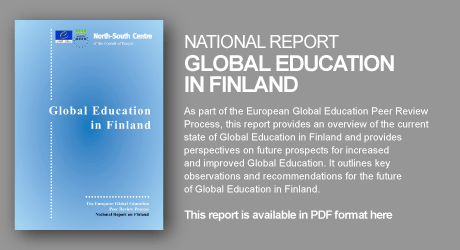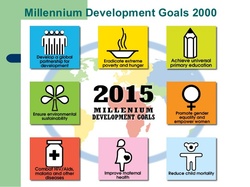
September 6-8, 2000
New York City, New York, USA
The United Nations Millennium Summit
The Millennium Declaration - The Declaration can be read here.
"The Summit Declaration cited freedom, equality (of individuals and nations), solidarity, tolerance, respect for nature and shared responsibility as six values fundamental to international relations for the twenty-first century." (http://www.un.org/en/development/devagenda/millennium.shtml)
New York City, New York, USA
The United Nations Millennium Summit
The Millennium Declaration - The Declaration can be read here.
"The Summit Declaration cited freedom, equality (of individuals and nations), solidarity, tolerance, respect for nature and shared responsibility as six values fundamental to international relations for the twenty-first century." (http://www.un.org/en/development/devagenda/millennium.shtml)

26 August 2002 - 4 September 2002
Johannesburg, South Africa
World Summit on Sustainable Development (WSSD)
"At the 2002 World Summit on Sustainable Development (WSSD) held in Johannesburg, South Africa, sustainable development was reaffirmed as a central component of the international agenda."
(http://www.who.int/trade/glossary/story097/en/)

November 15 - 17, 2002
The Maastrich Global Education Declaration
The Hague, Netherlands
"The purpose of the Europe-wide Congress was to bring together national delegations from the member states of the Council of Europe, to develop, in the context of global political consensus regarding the Millennium Development Goals and the outcomes of the Johannesburg WSSD, a medium-term European framework for increasing and improving Global Education to the year 2015."
Global Education in Europe to 2015 Strategy, policies, and perspectives
The Maastrich Global Education Declaration
The Hague, Netherlands
"The purpose of the Europe-wide Congress was to bring together national delegations from the member states of the Council of Europe, to develop, in the context of global political consensus regarding the Millennium Development Goals and the outcomes of the Johannesburg WSSD, a medium-term European framework for increasing and improving Global Education to the year 2015."
Global Education in Europe to 2015 Strategy, policies, and perspectives
|
2004
The European Global Education Peer Review Process National Report on Finland "Finland has begun to respond to the educational challenges of globalisation. A recent curriculum framework contains global citizenship, human rights, multicultural and sustainability values; while there is also evidence of growing and improving global education in the non-formal sectors, funded mainly from the development co-operation budget." (http://www.coe.int/t/dg4/nscentre/Resources/Publications/GE_Finland_report_2004.pdf - page 80) |
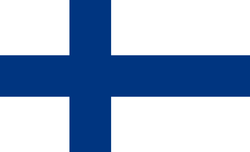
Global Education 2010
The Programme for Global Education
Published by the Ministry of Education, Finland
The Programme for Global Education
Published by the Ministry of Education, Finland
- Defines global education as activity which guides towards individual global responsibility and communal global responsibility; the ethic of a world citizen, which in turn is founded in fairness and respect of human rights
- supports growth into a critical and media-critical citizen with knowledge and skills to act successfully as part of one’s own community in a globalising world
- promotes national and international interaction, inter-cultural dialogue and learning from one another; global education is a process helping us understand and appreciate difference and different cultures and make choices that promote development
- helps to see the earth as an entity with limited resources, where one must learn both to economise resources and to share them fairly, equitably and equally
- increases knowledge and skills which help us understand the ever globalising economy and infl uence the rapidly changing economy and its social and cultural ramifi cations
- enhances initiative rising from an individual aspiration to work for a better world and from hope of its realisation, and
- comprises human rights education, equality education, peace education, media education, intercultural understanding, questions relating to development and equity, and education for sustainable development.
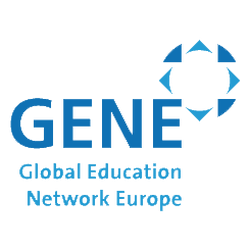
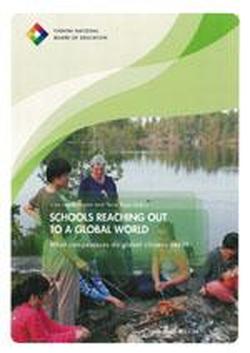
2010 - 2011
Schools reaching out to a global world
What competences do global citizens need?
Schools reaching out to a global world
What competences do global citizens need?
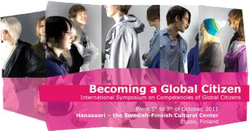
October 5-7, 2011
Espoo, Finland
Becoming a Global Citizen - International Symposium on Competencies of Global Citizens
This symposium addressed three key issues
Proceedings of the International Symposium on Competencies of Global Citizens can be found here
Espoo, Finland
Becoming a Global Citizen - International Symposium on Competencies of Global Citizens
This symposium addressed three key issues
- What is global education?
- What are key competencies of global citizens in general education?
- How can priorities of global education be nationally identified? (http://www.oph.fi/english/current_issues/conferences/becoming_a_global_citizen)
Proceedings of the International Symposium on Competencies of Global Citizens can be found here
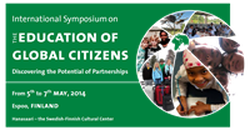
May 5-7, 2014
International symposium on the education of global citizens: Discovering the potential of partnerships
The symposium addressed five key issues:
Symposium Conclusions can be found here.
International symposium on the education of global citizens: Discovering the potential of partnerships
The symposium addressed five key issues:
- Global Education Across Curricula: Trends, Conceptual Foundations and Policy Learning
- Reform of Basic Education Curriculum in Finland – Mainstreaming Global Education?
- Role of Partnerships in Creating Global Responsibility – Releasing the Potential
- Reciprocity, Equality and Equity in the Education of Global Citizens
- Strategic Steps in the Implementation of Global Education (http://www.oph.fi/english/current_issues/conferences/education_of_global_citizens)
Symposium Conclusions can be found here.
I have identified five components of Global Education in Finland:
(1) Inclusion of values and elements of global education through the National Core Curriculum
(2) Local, school-based and teacher-driven articulation of the National Core Curriculum
(3) Collaborative, methodical approach to defining and implementing global competencies through Human Rights Education, Development Eduction, Peace Education and Sustainable Development Education
(4) work to engage all citizens in global education in and outside of the schools
(5) a commitment to equality.
1 - Geography/ Biology; Religion/ Ethics; vision at the beginning of the document; skills, attitudes and values
2 - Espoo, international focus; Vesilahti, Espoo; teacher driven examples, including music
3 - Conferences, publications, peer-review, projects; discussion of competence; examples of HRE, DE, PE, and SDE
4 - mm..hmmm....
5 - 9th graders at Vesilahti - - living the tenets of democracy, citizenship, and equity
NEXT CURRICULUM - INCLUSION AND INTEGRATION OF GCE AND TRANSVERSAL COMPETENCIES
